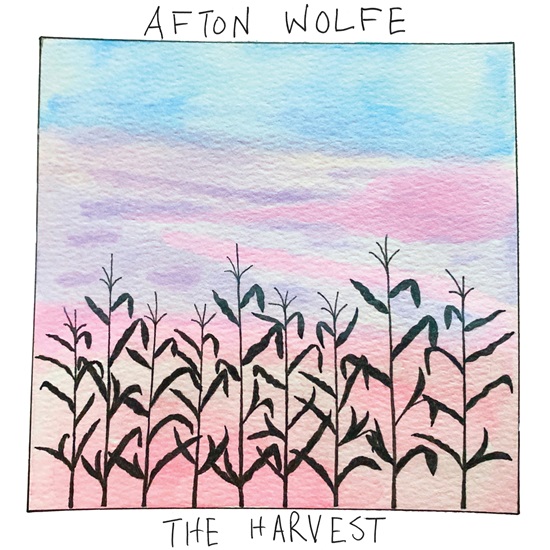
If anything’s predictable about the work of Afton Wolfe it’s the unpredictability. He has such a wide range of references and influences that you never know what’s around the next corner. The first surprise about ‘The Harvest’ is that there are no Afton Wolfe originals. The second surprise is that all of the songs are written by his father-in-law L.H. Halliburton so the album’s all about performance and interpretation of someone else’s songs, bringing all of his influences into play. Afton’s gravelly baritone serves all seven songs on this project perfectly the slightly sinister ‘Hello, Mr. Wolf’ – more about that later.
The album opens with ‘The Harvest’ which bounces along with hints of Van Morrison’s ‘Bright Side of the Road’ to put forward the idea that the year should begin in the fall with the harvest, rather than in spring with the sowing. ‘New Orleans Going Down’ has an unsurprising Dr John feel with the full band (including piano, of course). The vocal delivery echoes the rising of the flood water, becoming more impassioned with each chorus as the water levels become more dangerous. The next two songs get to the heart of Afton Wolfe; if you threw the DNA of Bob Seger and Tom Waits in a blender, you would get something close to Afton Wolfe vocally and stylistically.
The gospel-tinged ‘Lost Prayers’ with piano and fiddle fills evokes the classic mid-tempo Seger song, while ‘Hello, Mr. Wolf’ with its gruff spoken lyric and its off-kilter sparse arrangement and comparison of the wolf with human animals echoes Tom Waits at his most raw. The next two songs both look back in terms of style. ‘Till the River No Longer Flows’, with its message of persistence in the face of adversity has a big Southern rock sound in the good old Lynyrd Skynyrd style, including the obligatory extended guitar solo to the finish. ‘Mississippi’ has Afton exploring his soul/Stax roots with horns and piano triplets as he delivers L.H. Halliburton’s message to the state that mirrors Neil Young’s seventies message to Alabama. The album closes with the very lo-fi ‘Here to Stay’ exploring loneliness over a stuttering, reverbed piano backing saturated with tape hiss. It’s very evocative, bordering on disturbing.
‘The Harvest’ is an interesting project. Afton Wolfe doesn’t shy away from covers and interpretations, but covering seven songs by the same writer is a different challenge altogether and he absolutely aces it with his usual variety of styles and distinctive vocal delivery. Whatever Afton Wolfe tackles, you know it’s going to be interesting.
‘The Harvest’ is out now on Grandiflora Records.
Here’s the official video for ‘Lost Prayers’:
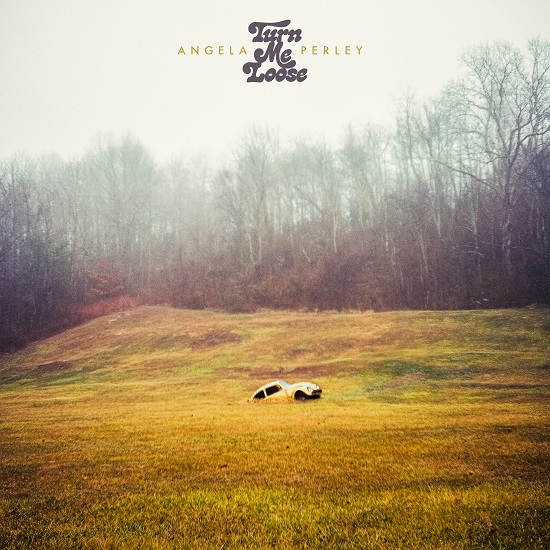
Angela Perley isn’t someone who wears her influences lightly; from sixties guitar rock through seventies country rock (Fleetwood Mac perhaps) to jangly eighties bands like The Bangles, The Go Gos and Katrina & The Waves. There’s also a touch of country/Americana thrown in, particularly on the penultimate song, ‘Holding On’, with its over-driven slide guitar and the pedal steel that adds just a tinge of blue to the entire album. Apart from the album’s final song, the solo piece ‘Wreck Me’, the songs are all fairly big productions with guitars facing off against each other, keys adding different textures and, of course, the sad machine pitching in with plaintive fills. To get the best from ‘Turn Me Loose’, you probably need to listen to it on the freeway (which sounds cool in a way that motorway never will) with the electric guitars playin’ way up loud.
From the opening song, ‘Plug Me In’, which channels the country rock of Eagles’ ‘Take It Easy’, adds a middle finger attitude and the urge to be moving which runs through the whole album with references to cars, planes, motorcycles, taxis, planes and even roller skates. Angela Perley’s desperate to be on the move; she needs to go somewhere, anywhere. Maybe it’s the inevitable reaction to a couple of years of movement restrictions after a long career as a touring musician – it’s certainly a theme that permeates the album.
‘Ripple’ is where Seventies glam-rock meets Lynyrd Skynyrd/Allman Brothers boogie; the riff is simple and the song’s driven along by powerhouse drumming as Angela sings about some of the things she wants to escape (including the vampires of the music business). Her influences are very clear musically and lyrically on the Sixties-inspired flower power-evoking ‘Near You’ with the reference to a “mellow fellow” and an almost English intonation in the lead vocal that harks back to the Sixties British invasion era.
‘Turn Me Loose’ is a collection of ten diverse songs pulled together by the combination of clean and over-driven guitars, Angela Perley’s musical influences and an itch to get out there and experience life again. You should listen to it on Route 66 in the summer, but you might have to make do with the M6 in spring. Either way, it’s going to sound great.
‘Turn Me Loose’ is available now from www.angelaperley.com.
Have a listen to the foot-stomping ‘Ripple’ here:
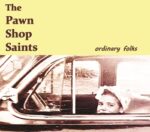 I always thought that hanging on in quiet desperation was just the English way. Apparently not; Jeb Barry of the Pawn Shop Saints has created a collection of nine songs, one a Jason Isbell co-write, that tell the stories and introduce us to the characters of forgotten America. The places that have lost their industries, jobs and hope, but not their self-respect. “Ordinary Folks” is also the sound of someone examining their own prejudices in an attempt to understand the lives of the people that he wouldn’t normally meet day-to-day; it’s a timely reminder that progress doesn’t necessarily benefit everyone. We understand that fossil fuels damage the environment, but that’s no consolation to the mining communities that have been wiped out. It’s not a cheerful album, but it’s uplifting; we see individuals and communities that refuse to be broken whatever the world throws at them.
I always thought that hanging on in quiet desperation was just the English way. Apparently not; Jeb Barry of the Pawn Shop Saints has created a collection of nine songs, one a Jason Isbell co-write, that tell the stories and introduce us to the characters of forgotten America. The places that have lost their industries, jobs and hope, but not their self-respect. “Ordinary Folks” is also the sound of someone examining their own prejudices in an attempt to understand the lives of the people that he wouldn’t normally meet day-to-day; it’s a timely reminder that progress doesn’t necessarily benefit everyone. We understand that fossil fuels damage the environment, but that’s no consolation to the mining communities that have been wiped out. It’s not a cheerful album, but it’s uplifting; we see individuals and communities that refuse to be broken whatever the world throws at them.
Musically, the stylings are string band-orientated with some nice twang guitar as a bit of occasional seasoning (although there are nods in the direction of gospel and skiffle as well) and fairly minimal and muted percussion throughout. There’s enough going on to embellish the songs, but not so much that the power of the lyrics is diluted. And they are certainly powerful lyrics.
The songs are roughly split between social comment and personal reminiscence and there are a few themes that run through the album. The personal stories include the autobiographical high school outsider tale of “Lynyrd Skynyrd” and the tragedy of a life that is only made bearable by cigarette breaks and a beer or two told in “Pack a Day”. Taking a wider perspective, while the album’s first three songs, “You Don’t Know the Cumberland”, “Old Men, New Trucks” and “Body in the River” all deal with the loneliness, isolation and alienation of life in forgotten towns, passed through by the politicians, and against the backdrop of the constant threat of flooding.
“Ordinary Folks” is a grainy black and white photo of life in the towns after the vultures have picked the bones clean and moved on. And somehow people still hope.
The album is released on Dollyrocker Records (DR20201) on Friday December 11th.
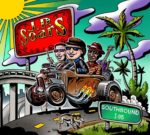 I-95; almost two thousand miles from Maine to Florida, if you’re Southbound like J.P. Soars. Not as well known as Route 66, but here’s a coincidence; I’m reading a guitar player’s memoir at the moment (next review up) which references I-95 extensively. And Southbound? Well that’s heading towards Florida and who wouldn’t, particularly in the winter? The title song’s a road song, plain and simple, in the age-old tradition; it’s the story of touring musicians, road dogs, and it’s the most straight-up, no-nonsense song on the album. No matter how sophisticated your tastes and influences get, it’s always fun to throw in a few loud riffs and fills
I-95; almost two thousand miles from Maine to Florida, if you’re Southbound like J.P. Soars. Not as well known as Route 66, but here’s a coincidence; I’m reading a guitar player’s memoir at the moment (next review up) which references I-95 extensively. And Southbound? Well that’s heading towards Florida and who wouldn’t, particularly in the winter? The title song’s a road song, plain and simple, in the age-old tradition; it’s the story of touring musicians, road dogs, and it’s the most straight-up, no-nonsense song on the album. No matter how sophisticated your tastes and influences get, it’s always fun to throw in a few loud riffs and fills
J.P. Soars is no average blues player. Great players don’t allow themselves to be defined by one genre; blues/rock might be at the centre of “Southbound I-95” but it doesn’t define it. And before we move on, there are fifteen songs on the album, but the funky “Sure as Hell Ain’t Foolin’ Me” crops up in ‘explicit’ and ‘clean’ versions (‘bullshit’ becomes ‘BS’) and “Arkansas Porch Party” reappears as the muted background for a hidden track.
If you’re this good, you don’t just keep recycling the same old licks; you keep moving on and soaking up more and more esoteric influences which then resurface in your work. You might do the Albert King and Muddy Waters covers (and J.P. does “When You Walk Out that Door” “Deep Down in Florida” with style and conviction) but there’s a lot more to it than that. Some of the stylings are fairly standard; “Southbound I-95” opens with a surf-punk guitar sound (think Dick Dale meets Link Wray, “Shining Through the Dark” is sixties pop-soul with a hint of “Hey Baby” while “The Grass Ain’t Always Greener” channels “Great Balls of Fire” and the Gary Bonds stomper “New Orleans”.
Things get a bit more esoteric with the mariachi horns adorning “Deep Down in Florida”, the surf meets Perez Prado sound of “Across the Desert” and the strangeness that is “Troubled Waters” which opens like Lynyrd Skynyrd before morphing into an Eastern-influenced instrumental breakdown with a banjo taking the sitar part and back into Southern rock again.
In a world where the hopes of megastardom as a blues/rock player are minimal (apparently there’s only room for one Joe Bonamassa at any given time) and you have talent to burn like J.P Soars, then you just have to follow your vision and go where it leads you. On the whole, this is a hugely entertaining album; it sounds like everyone’s having a great time and the playing is phenomenal – give it a listen.
Release date Friday March 8th .
And enjoy this:
 What a wonderful thing it is to be able to go, ‘yeah, I’ll have a bit of that’ when you’re in your local having a pint. So happens the promoter of the local folk club was in. So happens he’s a long-time mate of Steve Gibbons. Turns out he’s persuaded him to play an unplugged solo gig upstairs at the intimate but absolutely luverly (if we overlook the early-closing bar) Rainbow Room at the Foxlowe Centre in my current and I suspect final hometown of Leek.
What a wonderful thing it is to be able to go, ‘yeah, I’ll have a bit of that’ when you’re in your local having a pint. So happens the promoter of the local folk club was in. So happens he’s a long-time mate of Steve Gibbons. Turns out he’s persuaded him to play an unplugged solo gig upstairs at the intimate but absolutely luverly (if we overlook the early-closing bar) Rainbow Room at the Foxlowe Centre in my current and I suspect final hometown of Leek.
I haven’t seen him in 42 years, ever since I did the support rock ‘n’ roll themed disco and compere duties on a gig whilst he was touring Scotland just as his cover of Chuck Berry’s “Tulane” was in the top forty, having briefly made it into the top ten.
So, yeah, I will have a bit of that, thank you very much.
Said promoter, Dave Rhead, is also opening for SG tonight. This is brave of him as he has just fallen base over apex, stone cold sober and in full public view, over a local pavement. He’s well banged up and does well to hobble through “Leaving on a Jet Plane” and Anthony Toner’s lovely “Always Meeting my Cousins at Funerals”. To add insult to injury he managed this just outside Specsavers. Maybe he should….
When I last saw the Steve Gibbons Band they were absolutely in their pomp, top of their game. Huge great P.A. system, all the paraphernalia of a band signed to a major record company with a hit single and album in “Rollin’ On”. And he’s just finished a tour of parts of Scandinavia with a full band, so his trip to Leek for this solo low-key ‘unplugged’ set was clearly going to be something of a ‘gear change’ for him.
But he’s a trouper, is Steve Gibbons. His Dylan Project has kept playing gigs, he still packs them in on full band gigs, has played a number of big festivals in recent years, as well as solo and unplugged events like these. He is, to quote Pete Townshend, ‘road-worn’ but he cuts an elegant and dignified figure as he sets up to go.
First song is one of his early ones from the sixties. He was around in The Uglys and The Idle Race and the Dominettes before that – and the Dominettes can trace lineage back to 1960. This guy has been at it All Day. As far as I can discover, this is his first song recorded for a major label – “Wake up my Mind” was out on Pye back in 1965. Didn’t do much over here but went top twenty in Australia. They all count.
He then heads off into “The Chain” from “Maintaining Radio Silence” and “Wild Flowers” where the Dylanesque phrasing comes through and a lovely love song for Valentine’s Day, “Still in the Dark”. Can’t Get Next To You, Babe. The mystery of relationships and all that malarkey. “Graffiti Man” was an amusing aside from his observations of Birmingham life, and “Down in the Bunker” was a song that indeed took me back.
“I Got Chuck In My Car” finished off the first half of the set with more than a little nod to Jerry Reed’s “Tupelo Mississippi Flash”, a former hit single of his (apart from the fact that it’s a song about Elvis). More about that one, though, later.
Time to reflect.
The Steve Gibbons Band hit serious paydirt for probably the first time in the period 1976-1979; and he was by no means a young man by then. He was the right man at the right time, in many respects; rock ‘n’ roll and rockabilly were enjoying a resurgence, even amongst home-grown acts, and his energetic and fleet-footed reworking of Chuck Berry’s “Tulane” sort of bridged the gap between rock ‘n’ roll revisited, punk energy levels and pace and the (by then) rapidly fading pub rock scene. Also; it kind of fitted the zeitgeist. The Fonz. Grease was just about to hit VERY big. “American Graffiti”. Showaddywaddy selling truckloads, and here comes Shakin’ Stevens…..you get the picture.
But he was a whole lot more than that. In the second half of the show he began mining the rock ‘n’ roll roots as only someone who had been playing music and listening to all that amazing stuff first time around can. I honestly believe you don’t HAVE to be American to understand how great rock ‘n’ roll works (but it helps) but if you’re not, what helps a very great deal is if you were ‘around’ when these great, great songs were new to the world. And for that you really don’t need to be born in the fifties, like me; you need to be born in the forties, like Steve Gibbons. And through most of the second half of the set, he showed us how true that is. Starting with “Hey Buddy” dedicated to Buddy Holly, “Memphis Flash” (please see above!) dedicated to Elvis including a sneaky peek at “That’s Alright”, the drug mule song “Mr Jones” the roots of American rock ‘n’ roll music are laid bare by the dry, dust-bowl voice and the simple but authentic guitar chops.
The problem is – if you were born in the forties, you’re knocking on a bit now, and whereas age might have done really interesting things with his voice, he freely admits it hasn’t done him any favours in the memory department, so there are occasional meanderings and excursions, sometimes between songs, sometimes during a song, but on the rare occasions this happens he manages to scrape it all back together again and keep moving. Be under no illusions; his performance wasn’t perfect – as you might expect from someone carrying very many years on his back. But what he brought to the party meant you were absolutely forced to overlook that and to do otherwise would just be plain churlish.
This guy was more ‘Americana’ than many who currently wave that particular flag decades before anyone so much as mentioned the word. A point which is subtly underlined when he swoops into Dylan’s “Like A Rolling Stone”, Bo Diddleyfies “No Spitting on the Bus” (which might sound like Americana but is about as English in content as a pint of mild) and “Man in the Long Black Coat”.
Bizarrely, events are interrupted by the drawing of a raffle, before he draws the evening to a conclusion with a moving rendition of Rick Nelson’s “Hello Mary Lou” before being called back for an encore during which he wanders amiably through Chuck Berry’s “Memphis Tennessee”. Somewhere I imagine Dave Berry has neglected to start his gig with “Memphis Tennessee” but has decided to sing “Tulane” instead. The universe must be kept in harmony.
Yes.
Speaking with him afterwards was an absolute delight. He signed my 45s and indeed the page of our book where the Steve Gibbons Band gets a mention so I’m well chuffed. So the guy who toured America with The Who, and has shared stages with the likes of Lynryd Skynryd, ELO and Little Feat quietly packed his personal kit away, no doubt already contemplating the next stop on the seemingly endless road in whatever incarnation presents itself to him. Because that’s the deal.
Steve Gibbons is one of Britain’s last real troubadours who link directly back to the dawn of rock ‘n’ roll in the UK – had hits during (arguably) its most turbulent and explosive times – and yet whose voice and presence recall a world and a culture many miles removed.
If that moves your soul, catch him while you can. If not, well, your loss.
 Winter Mountain’s album “I Swear I Flew”, which was released in mid-November last year was one of those that worked perfectly as a coherent, self-contained project; you should really listen to it. It was also one of those that made you want to hear the songs played live. I got the chance to do that at 229 Venue 2 and I was absolutely right; it was exceptional, but not quite in the way I’d imagined. The album is mainly (but not completely) quiet and introspective but the live show was a very different beast.
Winter Mountain’s album “I Swear I Flew”, which was released in mid-November last year was one of those that worked perfectly as a coherent, self-contained project; you should really listen to it. It was also one of those that made you want to hear the songs played live. I got the chance to do that at 229 Venue 2 and I was absolutely right; it was exceptional, but not quite in the way I’d imagined. The album is mainly (but not completely) quiet and introspective but the live show was a very different beast.
Support on the night was Cornish singer-songwriter Josiah Mortimer, who warmed up a gradually-increasing crowd with a mix of the traditional (“Cadgwith Anthem”) and twenty-first century protest songs like “Build a Wall” – you can probably guess what that one’s about. With a decent voice, some interesting chat between songs and a playing style that uses a thumb instead of a pick (anyone remember Richie Havens?), Josiah got the audience onside and ready for the headliners.
Winter Mountain’s set opened with the wistful, impassioned romanticism of “Girl in the Coffee Shop”, a chance to set the tone for the evening, demonstrating Joe’s soulful voice and allowing the band to ease their way in before the Springsteenesque roar of “Sunlight, Good Roads”. Joe Francis has created a unique mixture with Winter Mountain, blending influences from the worlds of folk (mainly Gaelic), roots, country rock, southern boogie, straight ahead rock and many others. Springsteen aside, you can hear echoes of Hothouse Flowers, The Waterboys, Rob Thomas and Gin Blossoms (remember them?). The set had its quieter, more reflective, moments, particularly the (almost) solo interlude featuring “The Morning Bell”, the poignant “January Stars”, “Lucky Ones” and “Stronger When You Hold Me” but the set really caught fire when the band were playing full-tilt songs like “Things That I’ve Done Wrong” in balls-out Lynyrd Skynyrd mode as Joe started throwing lyrics from Zeppelin’s “Black Dog” into the mix. So hats off to Alik Peters-Deacon (guitar), Jake Galvin (bass) and Garry Kroll (drums) for a great, dynamic set and also to 229’s sound man, who did a lovely job in a venue that was barely half full.
Anything else you should know? The songs were split almost evenly between the first and second albums and the set ended with a Beatles cover, the early “Oh! Darling”. The audience was completely silent during the quiet songs and went bananas during the raucous ones. The band covered all the bases of the glorious musical mash-up perfectly, while Joe’s powerhouse voice left you in no doubt that he has a massive rock voice as well. It wasn’t quiet the night I‘d expected, but it was a belter; that’s the way to spend a Thursday night in London.
Coming to a festival near you soon, I imagine.
You can see some photos from the gig here.
 Every time I go into a venue in Soho like The Borderline, I wonder if it’s going to be the last time; the headlong rush to gentrify messy, sordid old Soho seems to be progressing at a frantic pace and it doesn’t look like there’s room in the planners’ brave new world for basement venues where you can hear great musicians play loud, beautiful and sometimes messy music. So I’m making the most of it while I can.
Every time I go into a venue in Soho like The Borderline, I wonder if it’s going to be the last time; the headlong rush to gentrify messy, sordid old Soho seems to be progressing at a frantic pace and it doesn’t look like there’s room in the planners’ brave new world for basement venues where you can hear great musicians play loud, beautiful and sometimes messy music. So I’m making the most of it while I can.
The occasion this time was the launch of Aidan Connell’s “Grio” album, and Aidan celebrated by putting together a programme which built steadily toward his headline appearance. The opening band on the night was The Wang Dang Doodle playing their version of Chicago electric blues; they sounded good and workmanlike, but really caught fire when Laurent Mouflier evoked the spirit of Little Walter with his blistering harmonica solos.
Next up was Southbound, a five-piece from Hertfordshire delivering a set of original songs inspired by (surprisingly enough)seventies multi-guitar bands from the Southern states of the USA; if you start with the Allman Brothers and throw in a bit of Lynyrd Skynyrd, then you’re probably fairly close. The rhythm section was tight and funky, allowing the two guitarists space to play together or trade solos, and the vocals were always convincing. They’re very good at the moment, but you can’t help thinking that there’s a lot more to come.
But this was Aidan Connell’s party and he was never going to disappoint. Throughout the set the band play in the tradition of the sixties power trio; rock-solid most of the time underneath the lead vocal and guitar, but with the ability to loosen up and improvise (or follow the leader) when required. The relatively short set opened with the uptempo “Everybody Else” from “Grio” and about half of the songs were from the album, including the absolute standout single, “I Hate Rock ‘n’ Roll”. The songs are strong, the playing’s spot on and there was even a bit of fun at the end of the set when Laurent Mouflier stepped back up to join the band for the final number, trading licks with Aidan and generally having a great time.
Aidan Connell’s a very interesting proposition; he’s heavily influenced by the original blues greats and the power trio era, but he brings some twenty-first century influences to the party as well. His voice is a bit more soulful than bluesy and he likes to introduce a bit of a psychedelic element as well. While some blues players can be a bit serious, or even precious, about the music, Aidan likes to have a bit of fun as well, playing solos with just the left hand while having a drink, playing behind his head and with his teeth; it’s not even showing off, really, it’s just someone who’s really, really good having a bit of a play while doing his job. Wouldn’t we all like to do that?
“Grio” is released on October 2 and we’ll have a review for you very soon.
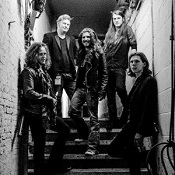 When you find out that a rock band’s from Norfolk, there’s one connection that you have to make and, yes, there is a link to The Darkness. Bad Touch made their debut EP in the Leeders Farm studio owned by The Darkness, but that’s where the link ends. This isn’t spandex hair metal; from the opening gently-picked guitar spiced up by a bit of slide, it’s obvious that Bad Touch’s roots go much further back than the noughties. Mix up a brew of the Allman Brothers Band, Lynyrd Skynyrd and Led Zep, throw in a bit of Chris Robinson and you’re just about there.
When you find out that a rock band’s from Norfolk, there’s one connection that you have to make and, yes, there is a link to The Darkness. Bad Touch made their debut EP in the Leeders Farm studio owned by The Darkness, but that’s where the link ends. This isn’t spandex hair metal; from the opening gently-picked guitar spiced up by a bit of slide, it’s obvious that Bad Touch’s roots go much further back than the noughties. Mix up a brew of the Allman Brothers Band, Lynyrd Skynyrd and Led Zep, throw in a bit of Chris Robinson and you’re just about there.
The single “Wise Water” is a taster for their new album “Halfway Home” which is released at the end of this month and it’s pretty successful in that respect. You get a sledgehammer guitar riff, a slide solo, a breakdown to drums and vocals (you know, the bit where the audience clap along) and a big live ending. It’s a pretty good single and if you like what’s on offer here, you’re probably going to like the album. We’ll find out in a few weeks.
“Wise Water” is out now.


